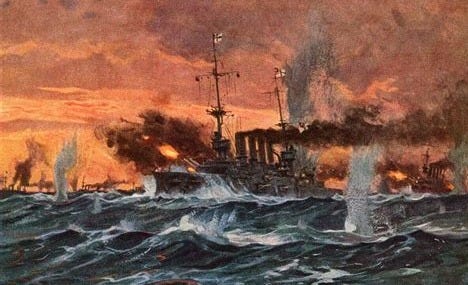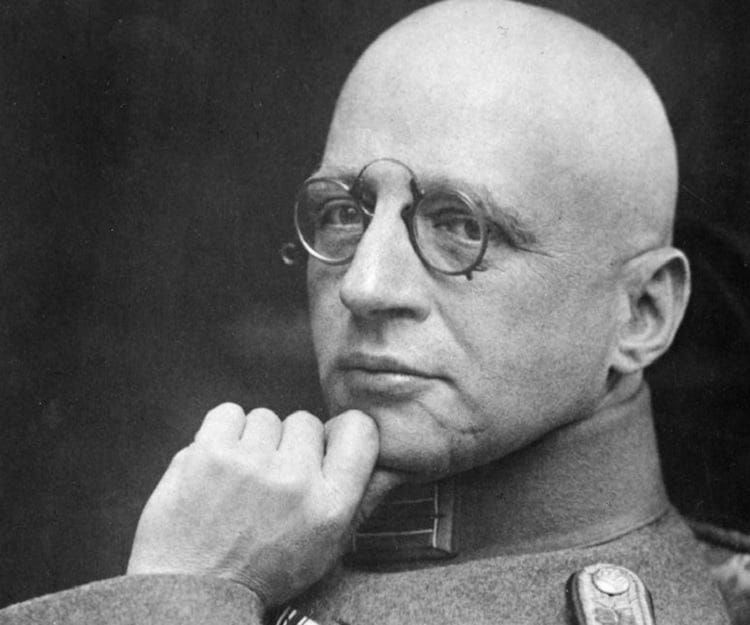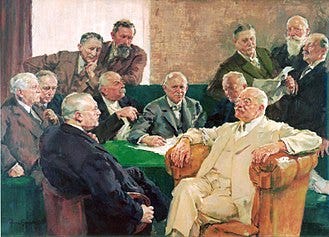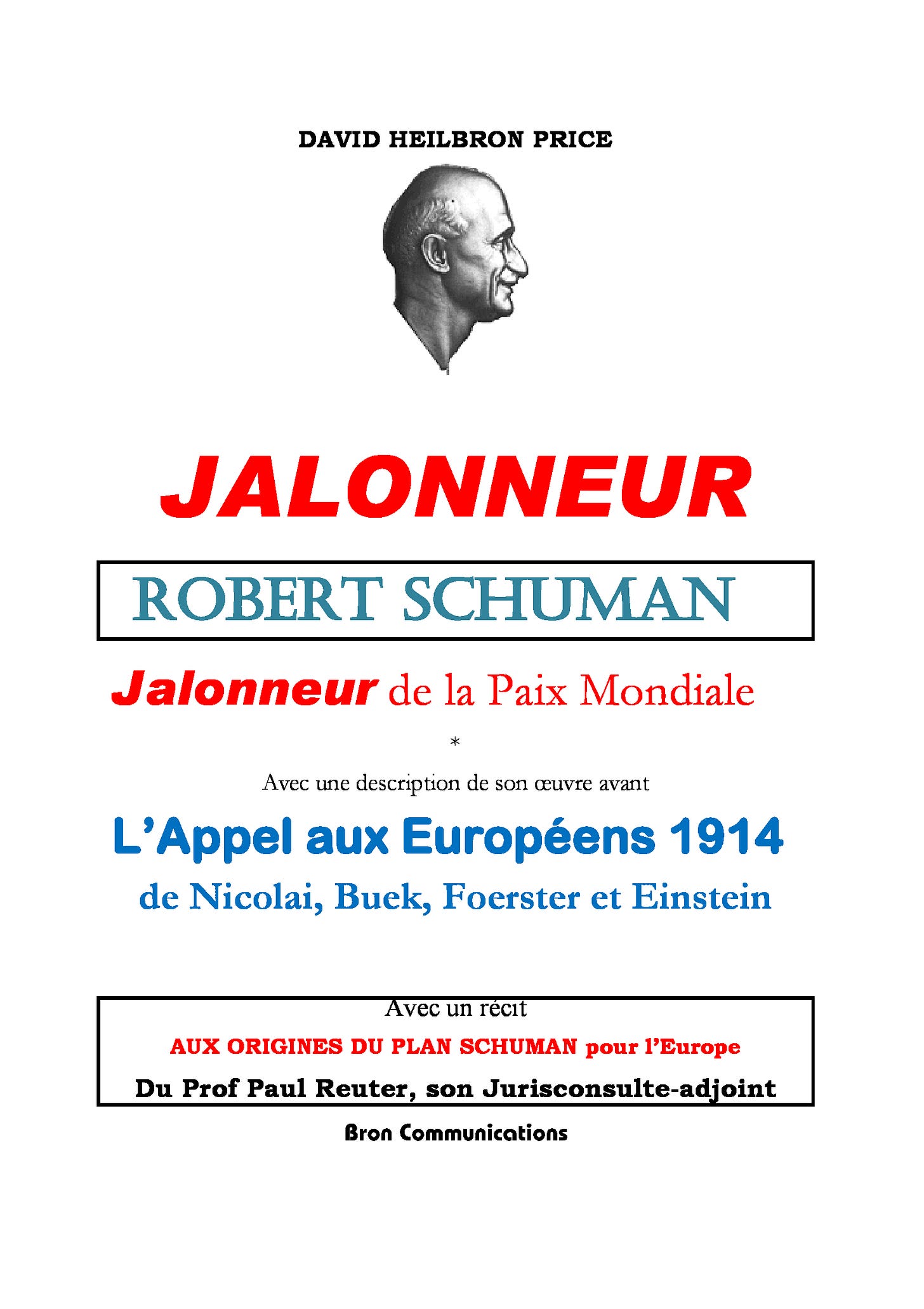Tariffs and Strategic Minerals of Peace for Dummies.
We are all Dummies when it comes to making Peace. Here's Help from Robert Schuman, initiator of Europe's Peace and Prosperity.
As the EU publishes a list of its strategic materials projects, ask what is missing:
how will it identify the needs, today and tomorrow,
how will it defend the supply
how will it ensure production and
will the urgent global need for strategic materials lead to wars?
The European Community created an ingenious and wise system to deal with strategic materials, put imports and the internal market under complete democratic control, safeguard European peace from enemies, and increase the standard of living and productivity. It understood the need for tariff protections.
In an evermore dangerous world, Europeans are now at increasing risk for their future by not reviving this Community system.
First what are strategic materials? How can you recognise their importance?
Strategic Dummies
Would anyone dare call Winston Churchill a dummy on strategy? Go back to the first months of World War One.
Winston Churchill was mystified.
In 1914 when the fighting started he had already been serving some years as First Lord of the Admiralty. In November the Royal Navy suffered a resounding defeat, the first in more than a hundred years. Commanded by Admiral von Spee, a German imperial fleet with two powerful heavy cruisers, Scharnhorst and Gneisnau was victorious.
Where did the battle take place? In the English Channel or the Baltic? No this major defeat of Great Britain took place off the far south shore of South America. And not the Atlantic side but the far Pacific side.
What was the German fleet doing there? In his The World Crisis, the six-volume work detailing all the events of World War One, Churchill called this the Mystery of Admiral von Spee.
After his victory, what did von Spee do? He disappeared from view only to reappear near the Falkland Islands in the southern Atlantic. Why? Churchill wrote:
We do not know what were the reasons which led him to raid the Falkland Islands, nor what his further plans would have been in the event of success. Presumably he hoped to destroy this unfortified British coaling base and so make his own position in South American waters less precarious.
Coal? In the Antarctic region? With Germany just at war and with existential threats to its supply chain? Churchill wrote these words in the mid-1920s, after much research into details of war strategy. It seems that he still had not bust the Mystery of Admiral von Spee. He didn’t figure out why he was interested in controlling the bleak, stormy waters of Cape Horn, the Magellan Straits and the Pacific coasts of Chile.
What was the primary German strategic goal there?
The answer is banal and shocking. Bird dung! The Germans had need for saltpeter nitrates for their explosives. Gunpowder is made of carbon, sulphur and saltpeter. Guano, the excretal deposits of seabirds found in mountainous quantities on islands, was an excellent source of nitrates for gunpowder.
He who controls the guano can fight on. He who has none will have to surrender when the gunpowder runs out. Chile had a near world monopoly of nitrates. Germany took a third of it.
Bird shit
In 1856 the USA had passed the Guano Islands Act allowing it to take possession of a hundred uninhabited islands in the Atlantic and the Pacific. The US imported some 700,000 tons annually. UK, France, Germany, Japan and others did the same. Guano was also important as a fertiliser. No country without a strong native agriculture can hope to be rich and independent and free from war.
Why is guano not a strategic material today? Why did Churchill not grasp its importance? Because of two things, this man, Fritz Haber, Nobel Prize-winning chemist, and something that nations then regarded as dirty, unusable nasty waste: coal tar.
The Haber-Bosch process provided an ingenious industrial means to create ammonia, nitrates and thus a central chemical in both fertilisers and explosives. Nitrates now came from Nitrogen in the air, not Chile. Coal tar was the waste product from making coke from anthracite coal in the steel-making process. Then it was discovered to be a treasury of chemicals for aniline dyes, chemicals and also … explosives.
This changed the course of World War One and reset strategic material priorities. A vast array of far more powerful nitrate explosives from dynamite of the Nobel group, gun cotton, picric acid, TNT derive from easy access to chemical nitration. Coal tar was a prime source for aromatic hydrocarbons, petrols and oils.
German industries of Agfa, BASF, Bayer, Hoechst arose and combined to form IG Farben. (IG stands for InteressenGemeinschaft, Community of Interests. Farben means Colors, in this case, Dyes from coal tar products). It consolidated as the world’s most powerful industrial trust but with an innocent name. It bred a number of Nobel Prize-winning scientists. It became the biggest global company with three times the number of employees of any company on either side of the Atlantic.
The Gods
In the 1920s the Nazis called it an ‘internationalist capitalist Jewish company.’ A third of its management board was Jewish. When in power, the Nazis had Haber removed, Bosch was sidelined and Jews were expelled from all management, scientific research and any work there at all. It was Jew-free. But who was then in charge? The self-serving directors decided it was useful to become members of the Nazi party.
With intricate manipulations of patent laws, IG Farben’s strategy rode still higher. The residual management of IG Farben called themselves the ‘Council of the gods’. They thought they were in charge of everything, including the Nazis. They decided their fate.
IG Farben’s Bayer bought hundreds of concentration camp women at 150 Marks each. Their doctors killed them in medical experiments. The purpose? Was it to trial pharmaceuticals to save life (perhaps) or to make profits? They bought more women.
IG Farben wanted a new factory for artificial rubber, Buna. They built one in Poland. Where? At a place called Auschwitz. They needed workers. Where did they get them? They made a deal with Hitler’s SS under Himmler. They did not employ them they leased those condemned to death nearby. IG Farben accountants reckoned that, fed minimal food, the concentration camp victims would last about nine months. So they leased death-slaves from Himmler. The SS got the money. The ‘workers’ died. Hitler called it a racket.
When the Allied forces took over IG Farben, the intelligence services interviewed the directors of IG Farben to find out their responsibility for war. This is what the intelligence report of Eisenhower’s Supreme Headquarters Allied Forces in Europe says.
Thus in a few short decades strategic priorities had moved from guano for gunpowder to a huge change of strategic goods, the Nazi destruction of ‘Jewish science’, and the tyrannical management of what was probably the most powerful company in the world. By its patents agreements it had a worldwide throttlehold. It had paralysing powers over rivals by a strategic network of commercial agreements that forbade them to work against it. They were led by the nose to become associates in the IG Farben plans. Those trapped in this legal cobweb included worldwide companies like Standard Oil in the USA, itself a powerful cartel.
Conclusion
Morals. Strategic materials can be used for good or bad, for peace or for war, for helping society or for domination and control. And for slavery and death or freedom and prosperity.
Change. Technological innovation can downgrade one year’s top strategic materials to pure excreta. Strategic materials are defined by advanced knowledge. The political question is how can the public exercise democratic accountability of the next generation of strategic development instruments and materials.
Lack of Vision. Even the brightest of us cannot foresee how all the factors in the economy, scientific discovery, technological development and the moral sphere will play out against each other. Humans are enigmatic and prone to turning good to evil.
Schuman’s Plan for World Peace
Today the European Commission has created thousands of committees of ‘advisers’, ‘stake-holders’, and others who may push themselves forward as experts. The Commission listens to them as they desire for good appearances. But who is not invited to participate? Who has no stake in decisions? Usually the poor and the weak in the economy. Whose voice should be paramount? The victims of economic abuse or the lobbyist whether openly known or disguised in ‘expert’ clothes?
The Original
How many expert committees were legally established in the original Community? It had the mammoth, pioneering task of making war materially impossible, bringing peace and prosperity and reconstituting the entire western European economy.
A hundred? Two hundred? Fifty?
No.
ONE.
The Consultative Committee was supposed to have absolute democratic accountability to the public. It was to be elected. It never was. (Elections were blocked. See La Communauté du Charbon et de l’Acier, by Schuman’s colleague Paul Reuter.)
The original idea was that it would be an elected tripartite assembly of European representative Associations of (a) entrepreneurs, (b) workers and (c) consumers. It was the first legal body to give democratic voice to consumers.
Each section would have access to intimate data on the most vital technologies and the direct consequences for them. It could advise on in-depth technicalities of the present state of the art and provide the most up-to-date outlook on the technological and social future of Europe.
With three equal sections, no one group could dominate: they had to agree on a just solution. It contributed its expert, agreed amendments to draft European legislation before it was decided by the Commission. It was more than advice. It involved proposed changes to draft law, just like the Council of Ministers and Parliament provided.
This is collective democracy. Schuman termed it the cooperation of the collectivities. It was just one institution, one part of finding a just solution for peace.
Elements of War
The first Community safeguarded the most strategic materials of the time: energy and steel. The European Coal and Steel Community not only provided a secure European market for these essential products of war and peace but its five institutions laid the foundation for lasting prosperity, the postwar economic miracle.
The Treaty of Paris was secured for an initial period of fifty years, renewable for a further half century. It wasn’t renewed in 2002. Who decided? Why? What were the consequences? This decision, taken in secret, exposed Europe to great dangers. We can see them today.
The price of steel rose immediately. Were steel-makers reforming cartels? The protections, including tariffs, were dismantled. Smart? No. Europeans lost control of their own industries. Both the energy market and foreign take-overs of the strategic steel sector were compromised by dumping or cartels. These were areas previously protected by the ECSC. The major virgin steel producer, British Steel, was taken over by the Chinese! Now it is scheduled to close with losses of thousands of skilled jobs. Stripped of ECSC safeguards, UK’s and Europe’s strategic nakedness is exposed.
Instead of fulfilling Schuman’s stated goal of extending Community principles in other sectors and across the whole continent to cover former Soviet-controlled territories and Russia and Ukraine, the Continent is now on fire and at war.
What were the principles that Schuman applied for peace and prosperity?
The real Community
Robert Schuman, was twice France’s Prime Minister, and at the centre of a number of initiatives in the immediate Cold War years, NATO, the Council of Europe and monetary stability. As Foreign Minister under Georges Bidault he announced an ingenious and flexible way to bring peace to Europe and a means to establish world peace: the European Community.
Schuman was born of a French Lorraine father and a Luxembourgish mother. He spoke the common language of the frontier States as well as French, German, some English and had a university level knowledge of Latin and Greek. He spent his whole life dedicated to bringing a peace system to Europe. The family home lay in Lorraine’s iron ore region. Before WW1 the ore fields were much coveted by German coal and steel cartels when the newer, richer discoveries were made.
It is a curious fact that Schuman’s solution was based on Community, the same word Gemeinschaft of IG Farben. The term was in widespread use earlier and it is quite likely that it was then faked by Farben from the classical, high principles of common good to then mean lethal corporate domination.
Schuman turned Community into a legal concept for the first time in history (Pour l’Europe, p50). For peace. In contrast to IG Farben’s distorted use, he wished to involve the interests of all, not just the profits of the industrialists, but the workers, the consumers, the interests of States to work together and the interests of peace. Each individual’s interest would be protected.
Peace comes when a just, open and honest solution is found to an outstanding strategic issue. Schuman said the European Community must tackle not only the problem of war but the causes of war.
How do Europeans arrive at a just solution that would stop the 2000+ year history of bloody warfare between nations and tribes? How to create lasting peace?
It had to incorporate:
Impartial justice on a European scale
Human rights and freedoms
Active voices of all the interest groups involved from
an individual to
groups of citizens, to
corporations to
nations.
To have a lasting effect it would have to be able to explore present and future strategic needs with in-depth research not only of the advantageous opportunities but with a sharpened awareness of the drawbacks and dangers.
That’s why when the six pioneer States of the Community created an impartial European Commission (then called the High Authority) it attached a consultative committee as an ancillary legislative body directly to it. It had access to the most in-depth information and human and economic. considerations necessary for wise strategic decisions of the High Authority. It wasn’t the Council of Ministers — it represented national interests. It wasn’t the Parliament — it was to defend the rights of individuals. The Court of Justice made sure all decisions were just and interests, big and small, were protected.
This wise counsellor body representing cooperation and comprehension across Europe was the Consultative Committee. Today it needs electoral revival.
Schuman and the founding fathers created these five institutions. They are still not active as they were designed to be or elected as prescribed. Far from it. Subsequent events show how political leaders did not enhance these democratic duties but went about digging graves for basic rights of individuals and associations.
Too many politicians today have gained the bad reputation of speaking pro-Europe but acting against the people. They changed the Community to serve their own account or with their own mistaken ideas without understanding Community history.
It became something so different that they called it the European Union. It wasn’t an improvement. The multiplicity of secretive committees and lack of proper elections are obvious indications.
Schuman warned:
Nothing is easier than for political counterfeiters to exploit the illusion of good principles. Nothing is more disastrous than good principles badly applied.
Let’s take just one example of many, the original Consultative Committee. It was to be the key institution for understanding economic forces, deciding strategy, setting goals, exploring the future, and identifying accountability. It is a vestige today with no power or accountability.
How was the economic system to be informed of the advances and dangers in the search for strategic materials?
How was the Community designed to detect external threats and create tariff barrier against aggressive and destructive forces?
How was the internal single market supposed to protect itself from national or international financial predation?
Europeans need this tool designed to protect the weak in society and direct the strong to laudable goals. For the first time in history the consumer had a voice in European legislation. Can anyone hear this voice today?
The Counterfeiters and the Destroyers
Many in the public would be hard-pressed to identify the instrumentality that the signers of the treaties put in place. The reason was unambiguously exposed by France’s Nobel Prize-winner for economics, Maurice Allais. His intellectual capabilities included high-flying economics and important contributions to experimental and theoretical physics.
Put simply, he said that in the 1980s and 1990s Europeans had been sold out by what he called ruiners of civilisation literally grave-diggers (fossoyeurs) who were burying Community Europe. They had down-graded the rights of the people. Instead of protecting Europe’s strategic Single Market’s economic values with protecting tariffs they had opened it wide to violent winds of unprincipled global competition.
Single Market Protection
How would the European Commission know how to call in tariffs to protect essential strategic materials? Politicians who believe ideologically that all tariffs should be removed will soon find their country is wrecked by competitors who are not so simple-minded. Suddenly one key material becomes essential for war and peace that the home market needs to import or protect the infant industries against predation.
Removing tariff protection opens the economy to outside forces — or war to get strategic materials. Nazi Germany found out to its cost that petroleum from refining coal tar could not produce high octane fuel for its fighter engines. The consequences were dire. Who had petroleum? Russia and Romania. A further secret ingredient was only made in America.
Europe’s Intelligence Service
Ignorance leads to disaster. Wisdom is despised by despots. Wisdom needs protection and the means to flourish if society is to gain its benefits.
The Schuman Plan envisaged testing ALL economic measures by a panel of democratically elected consumers, industrialists and workers. Its stated task was to help provide goods at the lowest price, improve productivity and raise the standards of living.
The electors would not be individuals but European associations. Business associations, consumer associations and worker associations are all democratic in the sense that any leadership can be thrown out if they do not respond to fairly to the membership.
The Way Forward
At the present, the Consultative Committees are not elected. Membership is designated in secret by the Council of Ministers. The first step must be to list all representative European associations of entrepreneurs, consumers and workers (not lobbyists or companies etc). The procedure is still apparent even in the modified treaties of the fossoyeurs. Acceptable European associations then elect the best suited to the seats in the Committees.
It is the responsibility of the Commission to draw up the criteria so a list of associations can be published. The membership list of the Committees is then sent to the Council for adoption. The Council of Europe retains this system and has a body representing European Non-Governmental Organisations.
Take heed of the danger! Without having public controls of an elected body like the Consultative Committee of the European Community, Europe may suffer the same fate of wars as its pre-history shows was normal.
That is the road to exploitation, discrimination, slavery and death.
Europe has the choice between IG Farben’s concept of a Community of Interests that leads to destruction or that of the European Community’s proven path to peace and prosperity.













